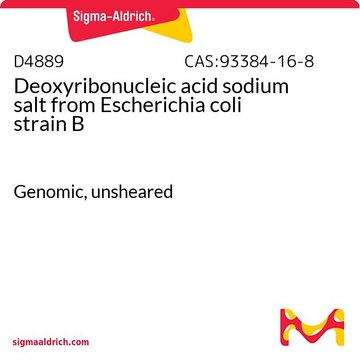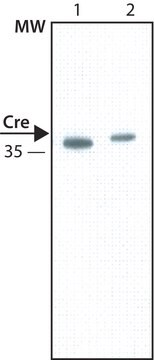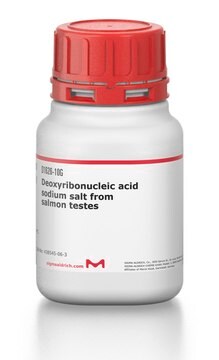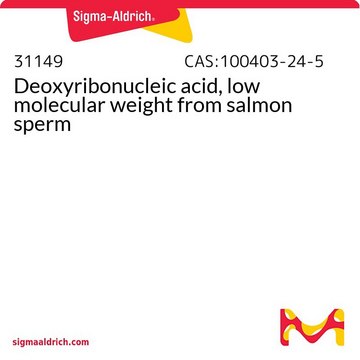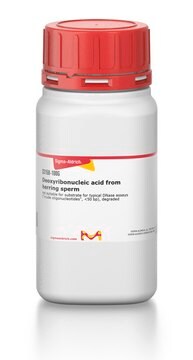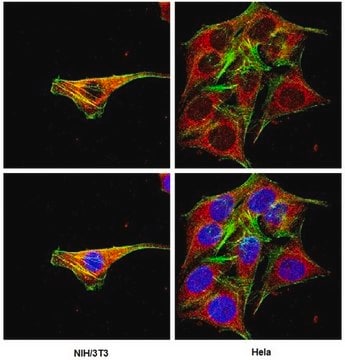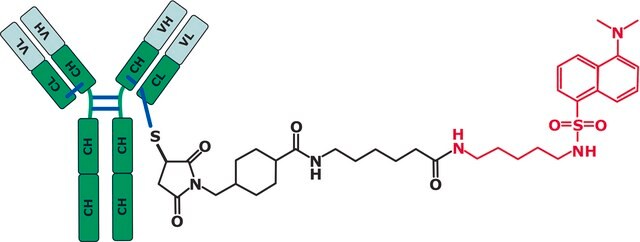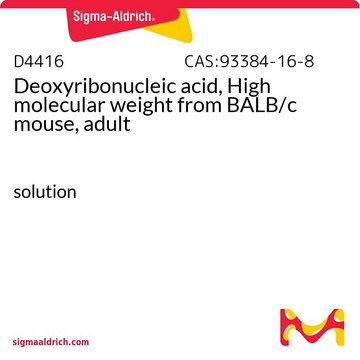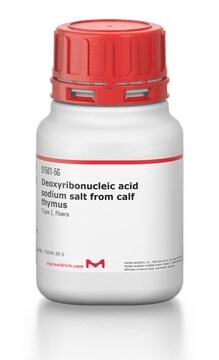D2001
Desoxyribonukleinsäure Natriumsalz aus E. coli Stamm B
Type VIII
Synonym(e):
DNA
Anmeldenzur Ansicht organisationsspezifischer und vertraglich vereinbarter Preise
Alle Fotos(2)
About This Item
CAS-Nummer:
EG-Nummer:
MDL-Nummer:
UNSPSC-Code:
41106305
eCl@ss:
32160414
NACRES:
NA.51
Empfohlene Produkte
Suchen Sie nach ähnlichen Produkten? Aufrufen Leitfaden zum Produktvergleich
Anwendung
Escherichia coli DNA has many uses in research. Escherichia coli DNA (ecDNA) is used in studies of DNA binding agents that modulate DNA structure and function. E. coli DNA is used in physicochemical studies of DNA behavior in solution, and to evaluate species-specific DNA structures and binding domains. This DNA is particularly useful for genomic analysis, including PCR, library construction in bacteriophage lambda, and in heterologous pre-hybridization and hybridization protocols.
Deoxyribonucleic acid sodium salt from Escherichia coli strain B has been used to measure the melting temperature (Tm) and in differential scanning calorimetry (DSC) studies. It has also been used as a template sequence in the polymerase chain reaction (PCR).
Angaben zur Herstellung
Prepared by procedure of Marmur, J., J. Mol. Biol., 3, 208 (1961).
Lagerklassenschlüssel
11 - Combustible Solids
WGK
WGK 3
Flammpunkt (°F)
Not applicable
Flammpunkt (°C)
Not applicable
Persönliche Schutzausrüstung
Eyeshields, Gloves, type N95 (US)
Analysenzertifikate (COA)
Suchen Sie nach Analysenzertifikate (COA), indem Sie die Lot-/Chargennummer des Produkts eingeben. Lot- und Chargennummern sind auf dem Produktetikett hinter den Wörtern ‘Lot’ oder ‘Batch’ (Lot oder Charge) zu finden.
Besitzen Sie dieses Produkt bereits?
In der Dokumentenbibliothek finden Sie die Dokumentation zu den Produkten, die Sie kürzlich erworben haben.
Kunden haben sich ebenfalls angesehen
R Richins et al.
Biotechnology progress, 17(2), 252-257 (2001-04-21)
The Escherichia coli DNA binding protein FIS is a transcriptional modulator involved in the regulation of many cellular processes, including the activation of rRNA synthesis. High-level overproduction of FIS in early, mid, or late log cultures resulted in growth-phase- and
William G Dundon et al.
International journal of medical microbiology : IJMM, 291(6-7), 545-550 (2002-03-14)
Infection of the stomach mucosa by the gastric pathogen Helicobacter pylori is accompanied by a large infiltration of neutrophils and monocytes which are believed to contribute substantially to H. pylori-induced gastritis. A protein was identified (HP-NAP for neutrophil-activating protein from
Geoffrey S Briggs et al.
The Journal of biological chemistry, 282(17), 12353-12357 (2007-02-20)
The DNA-binding protein, RdgC, is associated with recombination and replication fork repair in Escherichia coli and with the virulence-associated, pilin antigenic variation mediated by RecA and other recombination proteins in Neisseria species. We solved the structure of the E. coli
Mitsumasa Hashimoto et al.
The Journal of biological chemistry, 278(31), 28501-28507 (2003-05-16)
Closely opposed lesions form a unique class of DNA damage that is generated by ionizing radiation. Improper repair of closely opposed lesions could lead to the formation of double strand breaks that can result in increased lethality and mutagenesis. In
Differential scanning calorimetry of bacteria
Miles CA, et al.
Microbiology, 132(4), 939-952 (1986)
Unser Team von Wissenschaftlern verfügt über Erfahrung in allen Forschungsbereichen einschließlich Life Science, Materialwissenschaften, chemischer Synthese, Chromatographie, Analytik und vielen mehr..
Setzen Sie sich mit dem technischen Dienst in Verbindung.